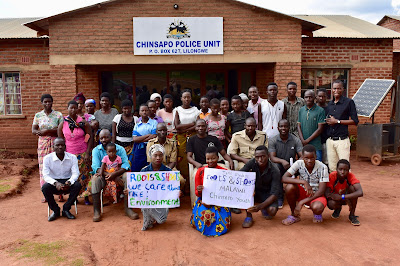UNDERSTANDING THE DONKEY TRADE
Do you ever wonder what the growing concern with the
“Donkey Trade” is about? Maybe you have a vague comprehension of the gist but
not the particulars about the matter. Donkeys have over centuries been of great
help to mankind; they have been used in agriculture, transport, and in some
societies, they are used for medicine. According to Dr. Ssuna, “more than half
the world’s population depends on donkeys for power…misconception of their
endurance leads to welfare issues” (Ssuna, 2016,p.15). The recent hike in
concern over Donkey welfare has arisen due to the recent increase in demand for
donkey hides by the Chinese.
 |
| Working Donkeys in India (image sourced from the internet) |
Traditionally, the Chinese use donkey hides to make Ejiao, a sticky gelatin like substance
which is believed to be medicine to cure several conditions such as insomnia,
coughs and is also believed to be a beauty potion. Donkey skin is said to be
rich in collagen which is beneficial for the skin. Even though Ejiao and this use of donkeys is age-old
in China, the recent rise in demand for donkeys in Africa and the product Ejiao itself across the world is
attributed to several reasons.
 |
| Chinese Ejiao made from Donkey hides |
Donkeys are known to be reared by humble communities
and due to industrialization; the Chinese economy has taken a turn in recent
years making China a global economic power to be reckoned with. This has led to
the reduction in the number of people raising donkeys within China, and so to
meet the growing demand for Ejiao the
Chinese eye has turned to Africa as the source for the much desired donkey
skins. Also, Ejiao is no longer for the Chinese only as was previously the
case. Dr. Ssuna adds that “the market is inadvertently broadened further by the
emergence of e-marketing, extensive travel and international investment by
Chinese companies and global investment by Chinese in TCM outlets.” (Ssuna,
2016, p.7) .
 |
| ALL CREATURES IMAGE-DONKEY SCOPING IN MOZAMBIQUE |
Concerns over the “Donkey Trade” arise excessively
due to misconduct in relation to animal welfare issues; the rearing, transportation
and slaughter of donkeys that are used in this trade has been said to be
gravely lacking in consideration for the well-being of the donkeys. One such
case was reported in South Africa, where four men were arrested in Polokwane.
The men had stuffed a truck that they were driving with over forty donkeys that
they were taking to the slaughter house. They did not mind that many of the
donkeys were crushed, collapsed or already dead. To them, the donkeys were
going to be slaughtered anyway. When the truck was apprehended, a lot of the
donkeys were euthanized as they were in great pain from the poor condition they
were subjected to during the transportation.
Another deep cause for alarm revolving around this
trade is the issue of theft. Since many of the families rearing the donkeys are
not well to do, they are unable to provide adequate security for their animals,
and so the unscrupulous donkey-skin traders take advantage of these circumstances
and steal the donkeys. This affects the livelihood of the families that depend
on donkeys substantially. For instance in Nigeria, the Nigeria Customs Service
closed down some export houses on
reports that stolen donkey skins were being exported out of the country, this
serves as an indicator of how far reaching the problem is.
 |
| Man in Mozambique who depends ob donkeys |
Another deplorable fact is that donkey traders
prefer buying ailing donkeys as they are pegged at a lower price but yet when
slaughtered and skinned they still get good quality skin which they are able to
sell off at a good price. The environmental and public health risk raised by
this cannot be overlooked; in Burkina Faso for instance, the people of one of
the communities stormed a slaughter house because the stench emanating from
there and was contaminating the air was a result of the unhygienic manner in
which the donkeys were handled at the slaughterhouse. This is the case even for
the other traders; they have not established hygienic means of disposing of
donkey carcasses after they have been skinned and so the carcasses decompose in
the open, posing a health risk to people.
 |
| Image courtesy of The Donkey Sanctuary |
 |
| Image Courtesy of The Donkey Sanctuary |
This is why many animal welfare organizations are
calling for a ban on the trade as it is adversely affecting the donkeys and
people as well. ALL CREATURES is also amongst the organizations involved in the
work of improving the welfare of donkeys. We are currently running a project I Tete
Mozambique and this we are able to do with support from The Donkey Sanctuary. We also want to play a part in ensuring that
the welfare of donkeys is properly considered.
 |
| ALL CREATURES Donkey Scoping in Mozambique |
 |
| ALL CREATURES Donkey Scoping in Mozambique |
References
Ssuna, R. (2016). Trade In Donkey Meat And Skin In Africa:
Implications on Welfare, People’s Livelihoods and Industry (A Donkey Sanctuary
Report).



Comments
Post a Comment